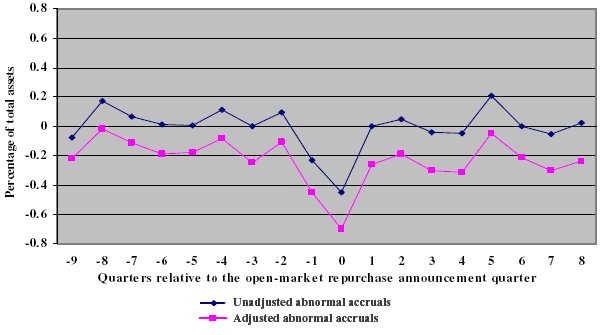Investors might suppose that a company repurchases shares when firm officers believe that the market is undervaluing its stock. Since these officers are highly informed, the stock is subsequently likely to outperform the market. How could executives be sure that their company’s stock is undervalued? In their November 2006 paper entitled “Earnings Management and Firm Performance Following Open-market Repurchases”, Guojin Gong, Henock Louis and Amy Sun investigate whether company management orchestrates stock undervaluation through earnings management (abnormal accruals) prior to executing share repurchases. Using financial and stock price data over the period 1984-2002 (1,720 open-market repurchase announcements that are followed by actual repurchases), they conclude that:
- The study confirms abnormal stock returns of 0.3%-0.5% monthly over one and two year periods following a repurchase announcement that is actually implemented.
- Abnormal quarterly accruals over the quarter of and the quarter prior to share repurchase announcements average -0.57% of total assets. Such downward earnings management occurs only for firms that actually buy back shares shortly after a repurchase announcement. The degree of downward earnings management increases with: (1) the percentage of total shares outstanding actually repurchased; and, (2) the level of CEO ownership.
- Pre-repurchase abnormal accruals relate negatively and significantly to both future operating performance (return on assets) and future stock returns. The largest abnormal negative accruals drive these relationships. Neither analysts nor investors seem to recognize the significance of the abnormal accruals.
- After accounting for earnings management, there is no evidence of performance improvement after stock repurchases.
The following chart, taken from the paper, shows unadjusted and adjusted abnormal accruals by quarter from two years before to two years after a subsequently implemented repurchase announcement. Adjusted accruals account for any unique accrual behaviors of similar companies. Results suggest that, on average, company officers exploit latitude with accruals to depress reported earnings just prior to announcing open market stock buybacks.

In summary, prior downward management of earnings (via accruals) is one reason that firms repurchasing shares generate subsequent abnormal stock returns.
So maybe stock repurchases, leveraged via earnings management, offer informed shareholders more bang-for-the-buck than dividends in terms of ultimate stock returns?